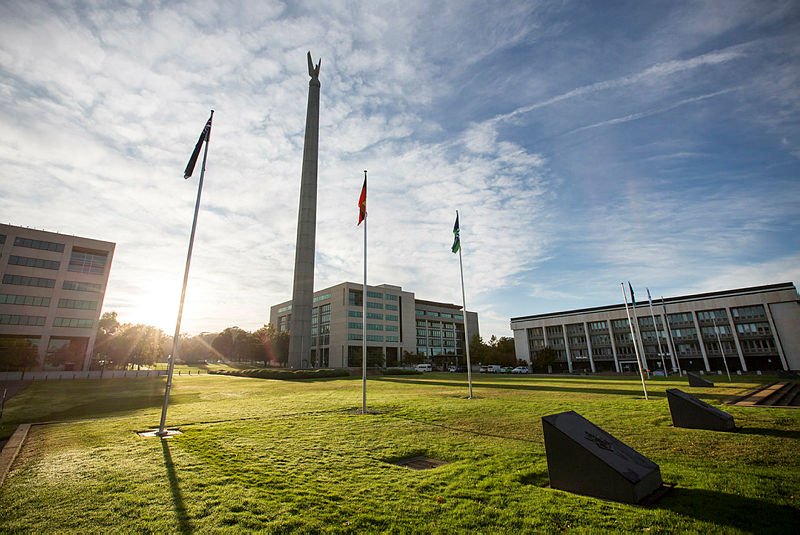
For the first time Australia now has two senior ministers in the Defence portfolio, with Marise Payne as Minister for Defence and Christopher Pyne as Minister for Defence Industry. Minister Pyne is more senior in Cabinet ranking, but Minister Payne is adamant they are equals in the portfolio. Last year the Abbott government’s First Principles Review proposed killing off the diarchy; this year the Turnbull government has doubled down and created another at the higher level! Wry comments aside, this innovation is strategically significant.
There’s always debate over whether economics is the foundation of security or the converse. This has a new twist, with some arguing that warfare is unrewarding for the major powers today, given the highly interdependent nature of the international system. Geopolitics is giving way to geo-economics. Foreign Minister Bishop might agree, given her observation that ‘economics is power and power is economics’. At least some think that the Prime Minister believes that trade is the new black, rather than preparing for conflict.
Reflecting that view, the Turnbull government’s election platform mantra was ‘jobs and growth’. Defence was often mentioned, but related to economics not security, with the continuous shipbuilding strategy being pitched in terms of ‘securing thousands of advanced manufacturing jobs for decades to come’ rather than the strategic value of the warships to be procured. So it’s not surprising that a new Defence Industry Minister position and lots of new industry support funding followed this new policy direction.
Critics will say this simply reflects pandering to the electorate—and in an era of Brexit and Trumpkins there’s much in that. A major issue in today’s global politics is the perception that globalisation’s economic benefits haven’t been sufficiently shared.
Transfer payments from the winners to the losers is one answer—and Australia has been remarkably successful in this compared to others. By some estimates, Australia is the second most equal on wealth distribution out of 27 major countries, with Japan topping the chart. Despite this, there are still worries that we could be declining towards the extreme inequality found in the US and the UK. But transfer payments are now unfashionable, so the big new idea is indirect government payments, such as paying a premium to build submarines in South Australia. That’s potentially better for many reasons: it can foster innovation, equips people with useful skills, gives individuals interesting lives, improves the nation’s capabilities and capacities, and helps ensure societal stability.
With the continuing rise of the machine, Artificial Intelligence might make most of us losers but that doesn’t mean the country will be poorer. In geo-economic terms the nation might well be better off, but governments wary of a displaced electorate might need to redistribute the new wealth, including through ‘make work’ exercises.
Defence seems an easy cash cow for such initiatives. Some argue that the money will be spent anyway, so why not spend it to get security and economic benefits—just as America or Sweden does? The huge US defence budget doesn’t just service security demands, but also serves domestic societal and industrial purposes. It would’ve been cheaper for the US to have bought Austral ships built in Perth but that’s not how it works, so Austral now builds them in Alabama.
For the Turnbull Government, the 2% GDP promised for Defence spending can seemingly undertake similar double duty. After all, the promise was for increased defence spending, not increased defence capability. But does that approach give a good return on investment? Economic rationalists would argue not, though there are enough analyses based on tax clawbacks etc. to muddy the waters. America’s view is crystal clear, but the business of America is business. For Australia though, would the nation be better off if government invested in some area other than defence? Would government spending in another industry sector be more efficacious?
Another popular reason for supporting costly national defence industries is that they can provide export income. Many OECD nations do so, like Switzerland and Norway. But most OECD nations export niche defence products and stay away from warship-building, a tough area to compete in. It’s not clear that Australia will it be able to leverage its spending on shipyards with exports. The experience of small- and medium-sized OECD nations suggests that Minister Pyne might need to find technology niches in which our shipbuilding companies can excel (like Austal’s mastery of aluminium hulls) if exports are the goal.
Defence’s capability requirements presently drive what Defence buys but an export focus could change that. The French government decided years ago that its Services would buy whatever conventional weapons the government (read DGA) and industry thought would sell internationally. (Its nuclear forces were treated differently.) France’s export-oriented defence companies were kept viable by the national defence budget. A similar approach here could influence how the ADF is equipped.
So which Defence Minister’s task has priority? If Defence wants to buy a top shelf capability from overseas but an Australian company offers something similar but not as good, or requiring a developmental effort, which prevails? The issue becomes more complicated when it turns to money: if the Australian product is more expensive than a comparable overseas product, which gets the contract?
Minister Pyne might be first amongst equal senior Defence Ministers, especially as he might ‘own’ more of the Defence budget. Minister Payne is ‘just’ concerned with preparing for and fighting wars, whereas Minister Pyne has a broad nation-building task that surely rivals cat herding in terms of balancing competing interests. Minister Pyne needs to produce really complicated stuff on time, provide a good return on investment, counter the negative aspects of globalisation and assist in winning the geo-economic battle. Oh, and he needs to do that by the next election in three years time. No pressure.

